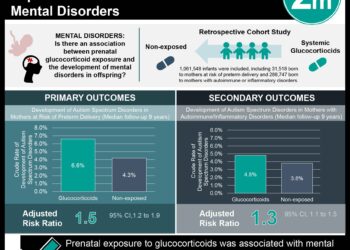Prenatal exposure to high-dose folic acid associated with increased cancer risk in children of mothers with epilepsy
1. The risk of cancer was higher amongst children of mothers with epilepsy who were exposed to high-dose folic acid in utero compared to controls in this retrospective study.
2. There was no association between maternal anti-epileptic medication use and cancer risk.
Level of Evidence Rating: 2 (Good)
Study Rundown: Patients with epilepsy are often cautioned against their medications’ possible teratogenic side effects. Common agents such as valproic acid and carbamazepine may cause neural tube defects in the children of mothers taking these prescribed medications. Subsequently, women are counselled to take high doses of folic acid before and during pregnancy to mitigate this risk. However, folic acid is known to interfere with DNA methylation, and it has recently been speculated that exposure to this agent in utero may be associated with increased cancer risk. The present study by Magne Vegrim et al. sought to describe this relationship.
In total, 3 379 171 children were included in this study. Of this group, 27 784 (0.8%) were born to mothers with epilepsy, 5934 (21.4%) of whom were exposed to high-dose folic acid in utero. Amongst the children of nonepileptic mothers, 46 646 (1.4%) were exposed to high-dose folic acid. The rate of childhood cancer in children born to mothers with epilepsy who took high-dose folic acid was 42.5 per 100,000 person-years compared to 18.4 per 100,000 in those not exposed to high-dose folic acid.
The present study by Magne Vegrim et al. determined that there is an increased risk of childhood cancer in the children of mothers with epilepsy who used high-dose folic acid during their pregnancy. These findings require further investigation, although if confirmed, this information could potentially alter current practices. A major drawback of this study is the inability to rule out confounding factors due to the retrospective study design. However, the study findings are bolstered by the large sample size and extensive data collection. Future studies should seek to address and rule out possible confounding effects and confirm these findings in an alternate setting.
Click here to read this study in JAMA Neurology
Relevant reading: Cancer risk with folic acid supplements: a systematic review and meta-analysis
In Depth [retrospective cohort]: A retrospective cohort study was conducted in Denmark, Norway and Sweden using data from 1997-2017. The final study population included more than 3.3 million children. Exposure data were ascertained through the prescription of either 1 or 5 mg of folic acid supplement during pregnancy. Outcome data about childhood cancer diagnoses were obtained using the national cancer registrar in each country. Finally, maternal epilepsy was assessed using diagnostic codes and/or the prescription of anti-seizure medication prior to pregnancy. The following agents were the most commonly used anti-seizure drugs: carbamazepine, lamotrigine, levetiracetam, and valproate.
The incidence of childhood cancer in patients of mothers with epilepsy who used high-dose folic acid was 42.5 (95% confidence interval [CI], 26.8-67.5) per 100,000 person-years and was 18.4 (95% CI, 12.8-26.5) per 100 000 person-years amongst children of mothers with epilepsy who were not exposed to folic acid. The adjusted hazard ratio for childhood cancer between these two groups was 2.7 (95% CI, 1.2-6.3). The absolute risk of cancer was 1.5% (95% CI, 0.5%-3.5%) in children of mothers with epilepsy who were exposed to high-dose folic acid. The absolute risk of cancer amongst children of women who took anti-seizure medication but did not use high-dose folic acid was 0.6% by comparison (95% CI, 0.2%-1.3%). These risk estimates were robust to sensitivity analyses, including the exclusion of children with major congenital or chromosomal anomalies.
Image: PD
©2022 2 Minute Medicine, Inc. All rights reserved. No works may be reproduced without expressed written consent from 2 Minute Medicine, Inc. Inquire about licensing here. No article should be construed as medical advice and is not intended as such by the authors or by 2 Minute Medicine, Inc.







